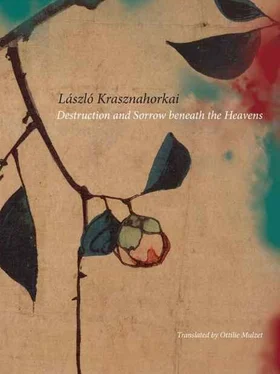yao. There are certain requirements if someone wants to become acquainted with classical culture. It’s true that the historical chronicles always mirrored the worldview of a certain dynasty in an extraordinary manner, and so the individual dynasties were continuously rewriting the past. But there was always one part of the intelligentsia that preserved its independence and wrote the truth in secret. These works are available for any young person who wants to read them.
But, Stein asks, can they actually read those old texts? Indeed, he raises his voice a little: Do they want to read these works at all? If we go into a library, will we see these classical works prominently figuring on the list of borrowed volumes?
The resignation which can be heard in Stein’s voice makes it clear to Yao just what this European visitor thinks of him. His response is as cold and as short as possible.
yao. They are more and more involved in reading these ancient writings.
Stein asks him if he means this seriously. The interpreter, turning red, translates his words. The evening cannot be salvaged.
yao. Yes. More and more. And there is ever-more interest in classical culture as a lifestyle.
Stein feels another outburst of grief, so that he no longer feels it necessary to try to save what could be saved. And because he feels himself to be impotent, he begins to mock, and he mentions that his, Yao’s life and lifestyle does not appear as if it would confirm everything that he just said. At least, looking at him, everything about him is reminiscent of an intellectual living well in a modern, industrialized society.
yao. That is just the appearance. Now I’m wearing jeans. But at home I have traditional Chinese clothes.
And do you wear them sometimes, asks Stein.
yao. Yes. And when I’m at home I always drink traditional Chinese tea.
So, not Cola, like now?
yao. No, tea.
And what do you read? The classics? When you lie down at night, do you take out some classic from the Tang era and go to sleep with that?
yao. I do have classical books. And I do read them sometimes, if not every day. Or I could say something else — I travel a lot. Very often I’ll stop in the middle of a beautiful landscape, and then I feel the same as those who were raised in the classical culture. A classical line of verse always comes to mind. And I love traditional music and theatre.
The interpreter tries to stop him but this is no longer possible, so Stein interrogates Yao, asking him: Just how does he keep alive the connections with all of this? Does he find concerts to go to, classical performances? Because you really have to hunt these down in Shanghai, they are so rare. .
yao. I don’t go to such events so very often. But sometimes I do.
Doesn’t that exactly prove that he himself could not live according to the principles of classical culture, as a truly living world, even if he wanted to? At the very least, from reverence, he could try to just not give up on a relationship of acceptance and deference to these traditions, no?
yao. It is not possible to live according to classical culture in every sense of the term. This is modern China.
Stein already feels joy that at least Yao has stated this. He would like to know if his acquaintances are just as faithful to tradition as he.
yao. Not my acquaintances, no. The Western way of life is more convenient. At the present time, it is the ideal. It is not certain that a traditional lifestyle can be adequate for modern times today. This has to be understood. That’s why we cannot speak of the usage of classical culture in the everyday sense of the term. For example, there is the traditional, long black coat, once much loved by the literati, with its characteristic buttoning. Traditional Chinese buttons. This is inconvenient, isn’t it? It’s hard to button up. The Western style of dress is much more simple and convenient. So why shouldn’t we take it up? But that doesn’t mean that I don’t admire the old way of buttoning as a tradition.
Hearing this example, Stein tries hard to keep a straight face, and asks instead if this does not prove that tradition is already dead, in the best of instances it is something for the museums, the reason for a Sunday excursion with the children who 10 minutes later want to go to McDonald’s. Otherwise: How could such a dialogue take place? Does he raise his children according to the principles of the classical tradition?
yao. Of course that is not possible today.
So then where can the viewpoints formed through classical culture — his own culture — be validated? Can he transmit it to his students in the university, if not to his children?
yao. My sense is that ever-more students are interested in traditional Chinese culture. In my view, there are very few who are not.
Once again there is silence at the table. The clamour in the restaurant is getting louder and louder. For a while they eat silently. The interpreter secretly nudges Stein to say something. He wipes his mouth, puts aside his chopsticks, and not worrying about whether what he is about to say has any connection to what they have been talking about, or if he has even mentioned it already, he says that he’s been in many Buddhist monasteries but every single one has been handed over to incompetents who have ruined the structures and created forgeries in the name of restoration. They have made trash out of the sacred. And there is no place for the Buddha in a building like that.
yao. You, sir, have only been here a few days, and you only see the surface.
Stein replies that he has been here for months, and not for the first time, and that he didn’t even begin the past few years but that he has been coming here since 1990, and he sees an unrelenting process, in addition to the destroyed monasteries he just mentioned there are, for example, the expensive entrance fees, the uncommonly aggressive merchandising, deception and lies. And the Chinese are doing this in the name of their own culture.
yao. That is just the surface.
Stein looks at him with innocent eyes. So what can he do so as not to see just the surface, if that’s what it is?
yao. There is no chance for you at all to understand anything about Chinese culture.
So — Stein hangs his head in resignation — nothing.
yao. You would have to live here, and you would have to know Chinese life. And something else: you do not know Chinese writing. The foundation of Chinese culture is the knowledge of Chinese writing. You will never know anything at all about Chinese culture.
It’s as if this thought had come to Stein from time to time, he concurs, and he acknowledges to Yao that what he has just said is very thought-provoking. Because he too feels the consequences of this lack. And he has even begun to study. Maliciously, he asks whether Yao is familiar with European culture.
yao. Of course I am. I’m seen as someone who knows European culture extremely well.
How much time have you spent in Europe?
yao. I’ve never been there.
Stein now frankly doesn’t understand, but propelled by a new idea he poses a further question: How many languages does Yao speak?
yao. Japanese and Chinese. That’s enough. Everything that is important is translated. Especially in recent years.
Cautiously — so as to not risk obliging their host to bring the evening quickly to an end — Stein asks him whether he does not consider that in getting to know Europe and European culture, Yao would not have to follow the same principles as he has just pointed out to Stein?
yao. No. A Chinese intellectual is different than a European one. And China has at its disposition a rich and tremendous cultural background. So what we understand from other cultures is quite enough for us to form our own opinions. China is interested in China, and our task is to lead China back, through its own traditions, to its former prominence in the world.
Читать дальше












